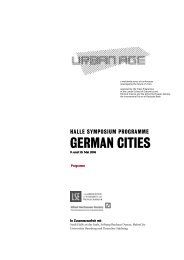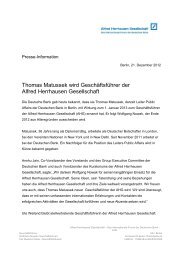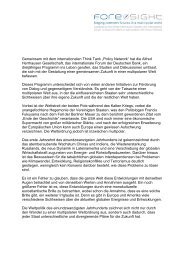India's role in a multi-polar world - Alfred Herrhausen Gesellschaft
India's role in a multi-polar world - Alfred Herrhausen Gesellschaft
India's role in a multi-polar world - Alfred Herrhausen Gesellschaft
Create successful ePaper yourself
Turn your PDF publications into a flip-book with our unique Google optimized e-Paper software.
56<br />
Through a billion voices: India’s <strong>role</strong> <strong>in</strong> a <strong>multi</strong>-<strong>polar</strong> <strong>world</strong><br />
was accompanied by terrorist attacks on the US<br />
embassies <strong>in</strong> Nairobi and Dar es Salaam and the<br />
attack on the US navy destroyer the USS Cole <strong>in</strong> 2000.<br />
The Cl<strong>in</strong>ton adm<strong>in</strong>istration was unable to devise and<br />
articulate a clear and consistent policy towards the<br />
Taliban. It <strong>in</strong>itially regarded the latter as a “factor for<br />
stability” <strong>in</strong> Afghanistan, with its leaders even hosted<br />
<strong>in</strong> the United States by the Union Oil Company of<br />
California (UNOCAL) <strong>in</strong> the belief that Taliban rulers<br />
would facilitate the transit of central Asian gas from<br />
Turkmenistan to the Arabian Sea, through Pakistan. The<br />
ramifications of the Cl<strong>in</strong>ton adm<strong>in</strong>istration’s <strong>in</strong>ability to<br />
either correctly assess or deal with the dangers posed<br />
by the activities of Al Qaeda and their Taliban hosts,<br />
and thus its failure to precisely identify and uphold US<br />
<strong>in</strong>terests <strong>in</strong> the region, are evident <strong>in</strong> the subsequent<br />
terrorist attacks of 9/11.<br />
Operation “Endur<strong>in</strong>g Freedom”, launched by the<br />
Bush adm<strong>in</strong>istration follow<strong>in</strong>g the attacks on the<br />
World Trade Centre, was both hastily and poorly<br />
planned. Indeed, it was def<strong>in</strong>ed by the reluctance of<br />
the US military leadership to place enough American<br />
boots on the ground to block the exit routes of the<br />
Taliban. The Taliban was ousted from Kabul, not by<br />
American forces, but by forces of Afghanistan’s<br />
Northern Alliance. And yet, due to the American<br />
failure to block the exit routes, the Kandahar based<br />
Taliban political leadership escaped across the Durand<br />
L<strong>in</strong>e <strong>in</strong>to Pakistan’s Baluchistan prov<strong>in</strong>ce, while the<br />
Taliban military leadership, together with Osama b<strong>in</strong><br />
Laden and the leadership of Al Qaeda and its Uzbek<br />
and Chechen allies, escaped <strong>in</strong>to the tribal areas of<br />
Pakistan’s North West Frontier Prov<strong>in</strong>ce.<br />
Rather than destroy<strong>in</strong>g global terrorism, Operation<br />
Endur<strong>in</strong>g Freedom merely dispersed the threat it<br />
posed. The close l<strong>in</strong>ks between Al Qaeda and the<br />
Taliban forged <strong>in</strong> the 1990s are abid<strong>in</strong>g and based<br />
on a shared aversion and <strong>in</strong>deed hatred for both<br />
pluralistic and democratic values, and religious and<br />
democratic freedoms. These l<strong>in</strong>ks have been further<br />
strengthened as a result of Operation Endur<strong>in</strong>g<br />
Freedom, as there now exists a shared determ<strong>in</strong>ation<br />
Terror, <strong>in</strong>stability and <strong>in</strong>terventions <strong>in</strong> south Asia | G Parthasarathy<br />
to ensure an ignom<strong>in</strong>ious American withdrawal from<br />
Afghanistan. Such fundamental realities appear to<br />
have been more widely understood by the Obama<br />
adm<strong>in</strong>istration. However, the perception that peace<br />
and security for the <strong>in</strong>ternational community can<br />
be atta<strong>in</strong>ed through a mere weaken<strong>in</strong>g of Al Qaeda,<br />
whilst effectively leav<strong>in</strong>g Afghanistan vulnerable<br />
to another Taliban takeover, cont<strong>in</strong>ues to prevail<br />
amongst certa<strong>in</strong> sections of the policymak<strong>in</strong>g<br />
community. This perception is both misplaced and<br />
dangerous.<br />
Towards a more holistic approach<br />
The London Conference on Afghanistan held on<br />
January 30, 2010, sought to assure the <strong>in</strong>ternational<br />
community and the people of Afghanistan that<br />
American and ISAF forces will not withdraw from<br />
the country and leave the constitutionally elected<br />
government <strong>in</strong> the lurch. However, the s<strong>in</strong>cerity of<br />
this vow has been underm<strong>in</strong>ed by what appears to be<br />
an unrealistic schedule for <strong>in</strong>creas<strong>in</strong>g the strength of<br />
the Afghan National Army and mak<strong>in</strong>g it an effective<br />
fight<strong>in</strong>g force. There also exists a significant level of<br />
doubt over the specific nature of the <strong>in</strong>ternational<br />
community’s policy of “re<strong>in</strong>tegration” of the<br />
Taliban back <strong>in</strong>to Afghanistan’s national life and the<br />
democratic process. Unfortunately, the announcement<br />
by President Obama of July 2011 as the date when the<br />
US will commence a drawdown <strong>in</strong> its troop strength<br />
<strong>in</strong> Afghanistan appears to have persuaded the Taliban<br />
leadership – and those whose support it enjoys – that<br />
the US has no option but to cut them a deal. There<br />
is also a widespread feel<strong>in</strong>g <strong>in</strong> India that while the<br />
US would <strong>in</strong>evitably f<strong>in</strong>d a premature withdrawal<br />
unacceptable, its British allies appear to be exhibit<strong>in</strong>g<br />
undue haste <strong>in</strong> their desire to exit from Afghanistan<br />
by seek<strong>in</strong>g “reconciliation” with large swathes of the<br />
Taliban. There exist deep misgiv<strong>in</strong>gs <strong>in</strong> both New Delhi<br />
and Kabul about British policies on this score. The<br />
current approach of President Karzai of reach<strong>in</strong>g out<br />
only to those Taliban members who renounce violence<br />
and accept the Afghan Constitution appears to many








